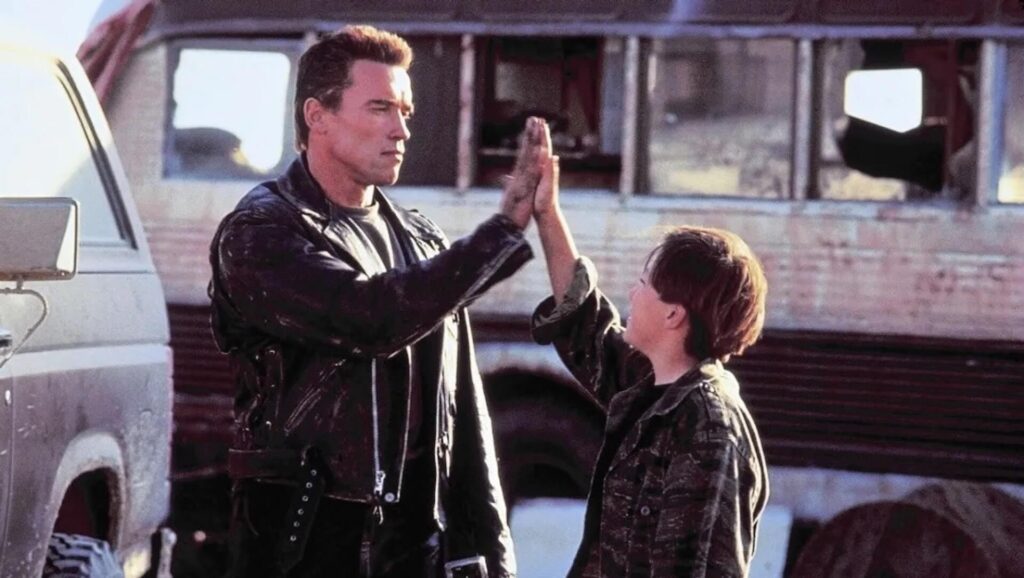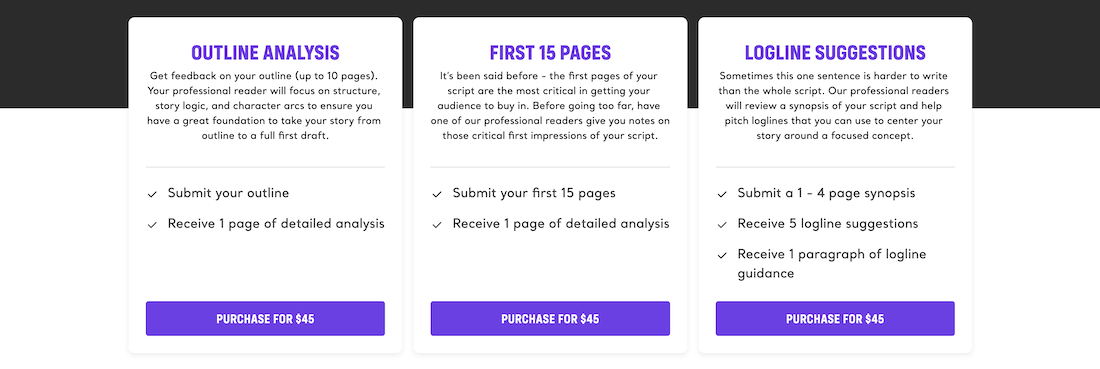Why Hollywood Can't Accept Unsolicited Material from Screenwriters

It’s one of the most frustrating barriers screenwriters have faced since the litigious era of the 1980s—being confronted with the legal message sent by an agent, agency, manager, management company, studio, network, producer, professional screenwriter, and development executive saying, “We cannot accept unsolicited material.”
I know. If you’re a screenwriter reading this, it has probably sent a chill down your spine.
But where did this come from? What enticed Hollywood not to want to read your amazing concepts, pitches, and screenplays?
Here we’ll discuss this topic from all angles to give you a better understanding of this Hollywood barrier all screenwriters must face—and I’ll also offer you some insider tips on how to avoid this catch-22 trap.
How the Screenwriting Landscape Was Before the 1980s
What many of you may not know is that the screenwriting landscape was much, much different than it is now.
Before the wave of corporate takeovers in the 1960s and 1970s, Hollywood studios were generally owned by individual entrepreneurs or families who founded and managed the companies. Most of the studios we know today were owned by:
- Warner Bros: Founded by the Warner brothers Harry, Albert, Sam, and Jack Warner.
- Paramount Pictures: Founded by Adolph Zukor, Jesse L. Lasky, and W. W. Hodkinson.
- Universal Pictures: Founded by Carl Laemmle.
- Metro-Goldwyn-Mayer (MGM): Formed by the merger of Metro Pictures, Goldwyn Pictures, and Louis B. Mayer Pictures. It was primarily led by Louis B. Mayer and Irving Thalberg in its early years.
- 20th Century Fox: Created from the merger of Twentieth Century Pictures (founded by Darryl F. Zanuck and Joseph Schenck) and Fox Film Corporation, founded by William Fox.
- Columbia Pictures: Founded by Harry Cohn, Jack Cohn, and Joe Brandt. Harry Cohn became the dominant force in the studio.
- Universal Pictures: Founded by Carl Laemmle.
Back then, movie studios were often tightly controlled by the founders or their immediate successors who ran them with a high degree of personal involvement. The transition to corporate ownership marked a significant shift in the film industry's structure and culture.
During those early decades, actors were signed to major contracts with these studios, which gave the studios the power to assign the actors to any studio film they wanted.
The same was often the case with screenwriters as well. Screenwriters were signed to contracts with studios, and would often work on multiple projects at a time in varying degrees of involvement.
By the 1970s, the corporate transition was well underway, with the old studio contract system largely dismantled. There was also a rise in independent production companies, which began to produce films outside the traditional studio system.
Today, this is predominantly how movies are made. Studios work more as distributors, beyond some of their tentpole franchises. This new Hollywood system allows screenwriters to work on a freelance basis rather than under long-term studio contracts.
 The Screenwriting Boom of the 1980s and 1990s
The Screenwriting Boom of the 1980s and 1990s
The 1980s and 1990s saw the rise of the spec script market. It started with the impending 1988 Writers Guild strike, which had studios clamoring for screenplays. After the strike, studios needed scripts to ramp up production once again. Since screenwriters had been on strike, they had a plethora of screenplays written on spec (under speculation that they would be sold) during the work stoppage.
Studio and production company development didn’t have any scripts so the demand for original material was high. Agents took advantage of that by driving the prices for spec scripts up via instigating bidding wars. Agents would dictate that their clients high concept scripts would only be available for a short period of time, with the buying rights going to the highest bidder.
This trend led to a screenwriting boom that went through the 1990s and into the 2000s until the next major writing strike (and accompanying economic collapse) of 2007/2008.
A Risk-Averse Hollywood System Was Born
There were plenty of significant lawsuits in the 1980s and 1990s that rocked the studio system. These lawsuits highlighted fierce battles over intellectual property, creative ownership, contract verbiage, and sometimes (but not always) frivolous claims.
One of the most notable cases involved the 1984 sci-fi classic The Terminator. Author Harlan Ellison claimed that the film's premise was lifted from his Outer Limits episodes "Soldier" and "Demon with a Glass Hand." Ellison's argument was persuasive enough that the case was settled out of court, with Ellison receiving a substantial payment and an acknowledgment in the film's credits.
The film’s writer and director, James Cameron, denied using any of Ellison’s work. He later claimed that the studio settled because they were afraid of a major ruling in the writer’s favor, despite the fact that Cameron knew he had not stolen any ideas. When comparing the two episodes to The Terminator script and film, there’s not too much that is overly similar beyond very general concepts.
Another significant lawsuit from this era centered on the 1988 comedy Coming to America. Art Buchwald sued Paramount Pictures, alleging that the studio had used his treatment, King for a Day, without proper compensation or credit. Buchwald's lawsuit resulted in a landmark decision that awarded him a settlement, acknowledging the studio's breach of an implied contract.
Many frivolous lawsuits followed these landmark cases. People were coming out of the woodwork looking for easy paydays, claiming that queries they mailed to the studios were used to rip off movies or claims that studios that never received their mailed pitches somehow made it into their hands after they sent them to others.
During the screenwriting boom of the 1980s and 1990s, everyone was trying to get in on it. Screenwriters would cold call agencies, studio executives, and producers to pitch their projects. Some would even mail scripts or even be so bold as to show up to agency and studio offices.
With endless queries and submissions coming in during this screenwriting boom, the likelihood of more and more lawsuits was beginning to scare the new studio system. It was getting out of hand—and Hollywood had to do something about it.
Read More: 9 Things Screenwriters Should Consider Before Signing Contracts

'Terminator 2: Judgment Day' (1991)
The No Unsolicited Material Policies Take Flight
At their lawyers' behest, Hollywood studios, agencies, management companies, production companies, and networks instigated company-wide policies: No Unsolicited Material.
What this policy means is that a company will not allow any material into their offices that was not requested. In fact, for now-obvious legal reasons, they won’t even open them. In today’s world, this translates to email queries and pitches as well.
When the 2007/2008 Writers Strike came, Hollywood became even more risk-averse. The spec market is now a fraction of what it was in the 1980s and 1990s because Hollywood doesn’t want to gamble on anything, even though time and time again, franchise movies aren’t delivering (especially post-pandemic), and more unique and original features are.
Yet the submissions are higher than ever—and the only we to mitigate that is the No Unsolicited Material Policy that most of the major studios, agencies, production companies, networks, and streamers employ.
They instead rely on their networking.
Solicited submissions from agents and managers are the only way into the majors, creating a sad and frustrating catch-22 where screenwriters are left needing a major agent or manager to get their scripts read by the majors—but many of those agencies and management companies have that damned No Unsolicited Material policy.
The Necessary Spec Script and Screenwriter Filtration System
The No Unsolicited Materials Policy is also part of the Hollywood filtration system. If Hollywood just opened all of its gates, it would be flooded with hundreds of thousands of screenplays. Beyond the aforementioned legalities, It would be impossible to get to all of these scripts.
Thus, this policy we screenwriters “love” so much also exists to ensure that the powers that be are getting the best of the best screenplays out there. Or, at the very least, they know that what they (or their script readers) are going to read and consider has been vetted by multiple people before them.
It’s a known fact within Hollywood that roughly 95% of the unsolicited material out there is terrible. 4% is average to above average. And not even 1% are worthy and ready for contracts. I’m speaking as a former studio script reader and story analyst in development as well—a filtration system is necessary.

Why Professional Screenwriters Don’t (or Shouldn’t) Read Screenplays of Others Either
I’ve been fortunate enough to have been a professional screenwriter for nearly 20 years, starting with my first paid contract for a development deal at Lionsgate back in 2007, just before the economic collapse and Writers Strike.
I then had an offer from a Hollywood executive come about via networking to take on two paid writing assignments, one of which became a miniseries with a bunch of name actors. I now write Lifetime thrillers with seven produced and distributed, and more on the way.
Throughout my career, I’ve mentored many screenwriters. However, I’m now on multiple contracts, with plenty of future contracts on the horizon after those projects have been produced and distributed.
I can no longer risk my career, nor that of those who employ me through these contracts, by hearing other people’s pitches and reading their screenplays. It’s also for the protection of the screenwriters themselves as well because all writers know how osmosis can happen.
If you meet a pro screenwriter at a writers' conference, through social media channels, or any other way, understand why they may decline your request to read your work or even hear your pitch.
3 Ways Around No Unsolicited Material Catch-22
It seems hopeless to live in a No Unsolicited Material world sometimes. But don’t fret. There are plenty of exceptions, workarounds, and keys into the gates of Hollywood for screenwriters.
Screenplay Competition and Fellowships
If you’re looking to get Hollywood eyes on your writing, look no further than screenplay competitions and fellowships like the Nicholl Fellowship, Final Draft’s Big Break, and ScreenCraft’s own competitions and fellowship (as well as others). You can also enter film festival competitions like the Austin Film Festival and Sundance, both of which offer amazing access to winners.
These types of programs bring legit Hollywood insiders into the mix—those looking for new material and for new writers. Hollywood uses these places as filtration systems to weed out the unworthy or unready.
There are no guarantees for winners. However, they offer an opportunity to break through if you find yourself in the right place with the right person/company, while holding the right screenplay they’ve either been looking for or didn’t know they needed.
Creative Networking
Creative networking is key. What’s creative about it? Since you likely don’t know any agents or managers well enough to get them to represent you (and later submit your work to their Hollywood contacts), you need to think outside of the box to find insider contacts,
The best way to accomplish this is to map out your networking possibilities. Rather than explain that here, click on the below link for a detailed tutorial on how to create your networking maps.
You can also create an industry network by entering the industry through another door.
Read More: 3 Maps Screenwriters Can Use to Build Their Industry Network
 Query Management and Production Companies
Query Management and Production Companies
Studios, networks, streamers, and agencies all usually have a strong No Unsolicited Material policy in place. However, many management and production companies are a little more lenient.
No, you can’t send your script directly to them, nor can you send detailed pitches.
However, general ideas can’t be copyrighted or claimed. So, it’s easier for them to take basic loglines, accompanied by a general query and request to submit more material. You’ll likely have to sign a release if they want to look further into your concept, but at least you are slipping a foot through their door.
---
So, there you have it. Now you know and understand why Hollywood generally doesn’t accept unsolicited material. The reasons are understandable. And now you know some ways around this annoying (but, again, understandable) policy.
Read More: Writing the Perfect Query Letter for Your Scripts
Check out our Preparation Notes so you start your story off on the right track!

Ken Miyamoto has worked in the film industry for nearly two decades, most notably as a studio liaison for Sony Studios and then as a script reader and story analyst for Sony Pictures.
He has many studio meetings under his belt as a produced screenwriter, meeting with the likes of Sony, Dreamworks, Universal, Disney, Warner Brothers, as well as many production and management companies. He has had a previous development deal with Lionsgate, as well as multiple writing assignments, including the produced miniseries Blackout, starring Anne Heche, Sean Patrick Flanery, Billy Zane, James Brolin, Haylie Duff, Brian Bloom, Eric La Salle, and Bruce Boxleitner, the feature thriller Hunter’s Creed, and many Lifetime thrillers. Follow Ken on Twitter @KenMoviesand Instagram @KenMovies7
Get Our Screenwriting Newsletter!
Get weekly writing inspiration delivered to your inbox - including industry news, popular articles, and more!


 The Screenwriting Boom of the 1980s and 1990s
The Screenwriting Boom of the 1980s and 1990s Query Management and Production Companies
Query Management and Production Companies
























